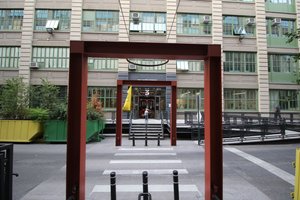NYC is ready for businesses of the future, not the past

I am Adam Friedman, Director of the Pratt Center for Community Development and I appreciate the opportunity to testify in opposition to the rezoning of Industry City.
Pratt Center opposes this rezoning because the world of real estate has changed and the city should not be building on the needs and real estate assumptions of the pre-Covid era.
Despite our clear opposition to this land use action, there are many things that Industry City is doing right as a business entity: their efforts to support workforce development and to build a bridge between their tenants and residents should be standard for all large-scale commercial development.
The City needs to act to revive its economy. But rather then acting “boldly” it needs to act deliberately. The City needs to acknowledge how much is uncertain about its future land use needs, and heed the community voices who have been championing a long-term vision rooted in the future of work.
Two quick illustrations of economic assumptions in this land use action that are outdated:
First, the city needs to rethink its industrial policy to consider not only the high-quality jobs manufacturing provides but the importance of production capacity, especially during a crisis. During the pandemic, local manufacturers were called upon by Economic Development Corporation (NYCEDC) and Health and Hospitals Corporation (HHC) to produce an amazing number of isolation gowns, masks and face shields every week—600,000 each! Local manufacturers were organized into hub and spoke clusters to achieve these goals. Two of those hubs were in the Garment Center and one was in Industry City.
The Garment Center has already been rezoned and we can expect displacement there, diminishing their capacity to produce essential personal protect equipment (PPE.) The proposed rezoning of Industry City would undermine another cluster of essential PPE production. If the pandemic had occurred two years later - after these zoning changes, after the displacement of their manufacturers, the City would not have been able to close the gaps in generating PPE as well as it did.
Second, the real estate market for office space in Manhattan has collapsed. I am testifying to you from 100 miles away because of a personal high-risk health condition. Lifelong New Yorkers, deeply dedicated to the city, do not want to get on a subway or ride a bus unless it is absolutely necessary. The “temporary” (2-5 years) changes to which we are adapting in the pandemic will permanently change our concept of “the office,” radically changing patterns of use and consequently, market demand, in the long-term. Opening up more office space in Brooklyn that is highly dependent on mass transit will not change this fundamental reality.
It is important to send the message that New York is ready for business. But the message should be that New York is ready for the businesses of the future. It should be that New York City is safe as a result of thoughtful planning to confront whatever new emergency arises in the future whether that is sea level rise or a pandemic.
If what happens in the Sunset Park community and the message it sends is of citywide importance, the Mayor needs to ensure that the resources invested in the area meet community needs and support their vision – which it currently dramatically fails to do.
Thank you.